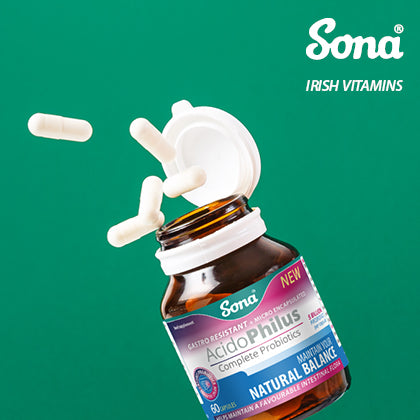
Two probiotics identified as promising high blood pressure, or hypertension, treatments.
An estimated 40% of the global adult population have high blood pressure, or hypertension, which puts people at risk of cardiovascular disease and other dangerous health conditions. Recent studies suggest that probiotics may offer a protective effect, but researchers have a limited understanding of why shaping the gut microbiota can regulate blood pressure.
A study published recently in mSystems specifies two strains of probiotics to the list of potential antihypertensive probiotics. In experiments on hypertensive mice, treatment with these two probiotics, Bifidobacterium lactis and Lactobacillus rhamnosus, returned blood pressure to normal levels.
These probiotics are found in Sona AcidoPhilus Complete – See www.sona.ie
Sona AcidoPhilus Complete - Probiotic Capsules
The researchers also tracked how those probiotics altered the animals' gut microbial mix over 16 weeks, identifying specific microbes and metabolic pathways that may help explain the protective effect.
Researchers say accumulated evidence supports an antihypertensive effect of probiotics and probiotic fermented foods in both in vitro and in vivo experiments and that the dietary intake of probiotics would well supplement traditional hypertension treatment.
Previous studies have connected the rising rates of hypertension worldwide to increasing consumption of sugar.
It boosts blood pressure through many mechanisms -- increased insulin resistance or salt retention, for example - but in recent years researchers have investigated sugar's effect on the gut microbiome, as well.
In the new study, the researchers assessed the two probiotic strains on mice that developed high blood pressure after consuming water mixed with fructose.
Over 16 weeks, they measured the animals' blood pressures every 4 weeks.
They found that fructose-fed mice that received either probiotic showed significantly lower blood pressures than those fed a high fructose diet and not treated with probiotics.
In addition, the researchers found no difference between the blood pressure readings of fructose-fed mice that received probiotics and a control group of mice that only drank water.
That suggests probiotic interventions would maintain blood pressure at normal levels, Li said.
Researchers say probiotics present a promising avenue in preventive medicine, offering potential in regulating hypertension and reshaping medical approach to cardiovascular health.
Source: Science Daily
